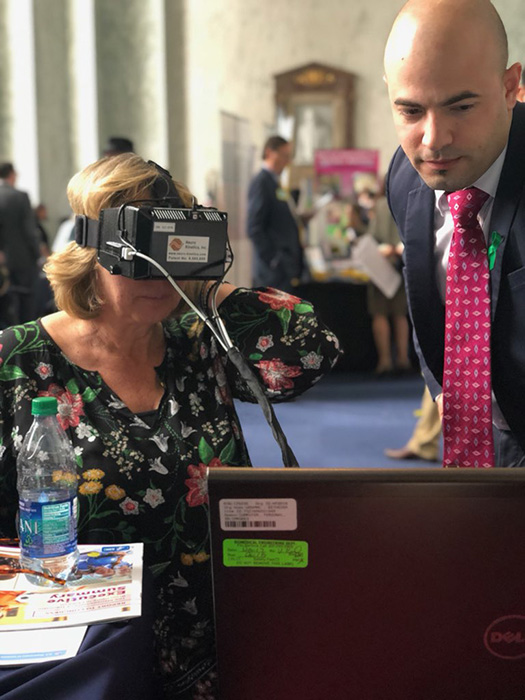Technology on the Brain: Lawmakers, Scientists Team Up for TBI Solutions

Sally Mastroberti walked into the main foyer of the Rayburn House Office Building in Washington, D.C. and breathed a long, slow sigh of relief.
"I spent a long time trying to find answers," she said. "Glad I wasn't the only one."
Following her daughter Lila's grueling recovery from a concussion suffered in 2013, Mastroberti joined Positive Strides, a non-profit organization dedicated to helping high school and college athletes recover from head injuries. Standing alongside the dozens of other, similar TBI awareness groups and advanced technology vendors attending the annual "Brain Injury Awareness Day on Capitol Hill" event on March 20, Mastroberti finally felt amongst friends.
"Back when it first happened we tried everything from vision therapy to acupuncture," she said. "We didn't know all this other stuff was out there."
Lila, a scholarship athlete at High Point University, suffered her head injury during her sophomore lacrosse season and eventually had to leave school briefly, resulting in her eventually losing her scholarship in the process. According to Sally, the ensuing months stretched on forever as Lila battled a slew of related health issues.
"The concussion happened on a Friday and by the time I saw Lila just two days later, she was a different girl," she said.
Co-hosted by the Brain Injury Association of America and the bi-partisan Congressional Brain Injury Task Force, "Brain Injury Awareness Day on Capitol Hill" was conceived 17 years ago as a means to draw attention to a growing problem both inside and outside of the U.S. military.
"Helping people at risk, regardless, of where they are, underpins everything we do," said Dr. Marcello Pilia, Nuerotrauma & Traumatic Brain Injury Portfolio Manager for the U.S. Army Medical Research and Materiel Command's Combat Casualty Care Research Program.
Annual reported incidents of TBI among active-duty military personnel have more than doubled since 2000, while annual TBI-related hospitalizations and deaths amongst the larger American public have increased substantially in recent years according to federal data. With those numbers as a backdrop, "Brain Injury Awareness Day on Capitol Hill" brought together more than 50 hospitals, non-profit organizations, vendors, corporate partners, and government entities to share new and evolving research with the American public.
"This is the most important thing we can do is call attention to this issue," said Rep. Bill Pascrell, co-chair of the event, during a guided tour of the technological advancements developed by the CCCRP.
For someone like Sally Mastroberti, who's also a former collegiate athlete herself, the technologies on display on Capitol Hill are the keys to moving forward. Just as her daughter found her footing with physical therapy and cranial massages, so too can someone else find help in more high-end alternatives.
"These things represent a new reality," said Mastroberti, "and maybe also a break from the constant reality of living with a TBI."
 An official website of the United States government
An official website of the United States government
 ) or https:// means you've safely connected to the .mil website. Share sensitive information only on official, secure websites.
) or https:// means you've safely connected to the .mil website. Share sensitive information only on official, secure websites.


